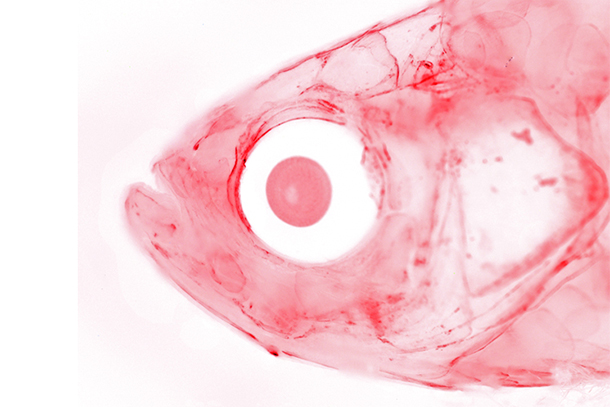The National Institutes of Health (NIH) has recognized USC scientist Gage Crump, PhD, with an Award for Sustaining Outstanding Achievement in Research — an eight-year, $8 million grant to support the development of stem cell-based treatments for patients with craniofacial diseases.
“Perhaps the best part of this award is that it funds the investigator, rather than a specific project,” said Crump, associate professor of stem cell biology and regenerative medicine at the Keck School of Medicine of USC. “Many seminal discoveries in biology were made by scientists following their passions and taking risks to pursue new areas of research, yet unfortunately much project-based science is often tied to short-term gains. I am therefore extremely grateful for the confidence that NIH has placed in us with this longer-term investigator-based award. In particular, this award will afford us the flexibility to develop novel zebrafish models toward understanding where stem cells come from and how they can be better harnessed to repair damaged organs.”
Awarded by the NIH’s National Institute of Dental and Craniofacial Research, the grant supports the careers of the most accomplished scientists with the strongest track records of productive and innovative research.
After completing his PhD in cell biology at the University of California, San Francisco, and his postdoctoral training in developmental biology at the University of Oregon, Crump established an independent laboratory at USC in 2006.
Using zebrafish as a model of human craniofacial development and disease, his team has pioneered new ways to study the development, maintenance and regeneration of the head and face. He has identified important genetic and cellular contributors to arthritis, bone anomalies and serious birth defects such as the premature fusion of the skull (known as craniosynostosis). These discoveries have appeared in top scientific journals, including Developmental Cell, eLife, Development and PLoS Genetics.
Crump is also dedicated to fostering the next generation of stem cell scientists. In 2013, he created USC’s PhD Program in Development, Stem Cells and Regenerative Medicine, which he continues to direct. In 2017, he won a USC Mentoring Award for his exceptional efforts in guiding graduate students to success. His many trainees have secured postdoctoral, faculty and industry positions, and won prestigious fellowships from both NIH and private sources.
“One of the greatest joys of being an academic scientist is seeing my former trainees succeed,” he said.
Moving forward, Crump will continue to explore how progenitor and stem cells build, maintain and regenerate the face and head — and ultimately use the lessons learned from zebrafish to advance treatments for human patients.
“Our department and center’s broad goal is to direct basic research findings to treat injury, disease and congenital defects through regenerative medicine,” said Andy McMahon, PhD, chair of the Department of Stem Cell Biology and Regenerative Medicine. “What Gage does better than almost any other zebrafish researcher I know is to find relevancy in his research to the human condition.”
— Cristy Lytal


